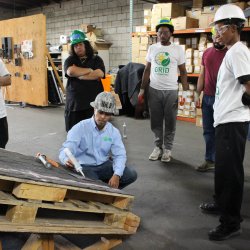Before the COVID-19 pandemic, the solar industry was on track to have a record-breaking year as one of the fastest-growing industries in the United States. Now, the industry estimates it has lost 72,000 jobs due to COVID-19. Thankfully, we're seeing solar bounce back and, with the right investments, clean energy is well positioned to add billions of dollars and hundreds of jobs back into the economy.
The pandemic has also impacted GRID's workforce development teams. In mid-March, as stay-at-home orders went into effect across the country, GRID affiliates paused our in-person training programs. Since then, our affiliates have expanded GRID’s training offerings through online learning and continued to engage our trainees and training partners as they begin to safely offer opportunities for more in-person, hands-on experience.
“The sun is always going to be there if we can catch it,” said Dorothy Watts. Dorothy is currently completing paid job training, safely installing solar on a multifamily affordable housing project in the Bay Area. “It's really nice to go to work daily and have a routine that is stable with the same group of people, building something and seeing progress on a daily basis.”
The COVID-19 public health and resulting economic crisis are also having a disproportionate impact on communities of color. Last month, Adewale OgunBadejo, Workforce Development Manager with GRID Alternatives Greater Los Angeles hosted a webinar with Kenneth Wells, CEO of O&M Solar and Saun Hough, Vocational Services Administrator at SHIELDS for Families, on the opportunity for meaningful investments in workforce development to address systemic racism.
As the solar industry recovers from the pandemic, it will be a source of well-paying careers with upward mobility and the number of people interested in solar careers continues to grow! Training is critical to help people get back to work who have lost economic opportunity due to the pandemic. Training also provides opportunity for people impacted by the justice system to be hired by a growing industry, while building an equitable and just clean energy future.
“The demand for the training is higher than ever and I think it’s going to be like that for the foreseeable future,” said Adewale. “Many people have lost jobs and those jobs are not coming back. Some of those people are going to need to be retrained and retooled and solar is a viable field with low barriers to entry.”
Adewale also noted that, in Los Angeles, while several companies had a hiring freeze in place for the initial months of the pandemic, work seems to be picking up again, creating new opportunities for people looking to jumpstart their solar careers.
Watch GRID Greater Los Angeles' full webinar: Addressing Systemic Racism Through Meaningful Workforce Investments

